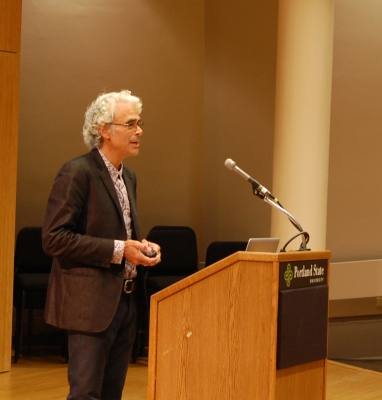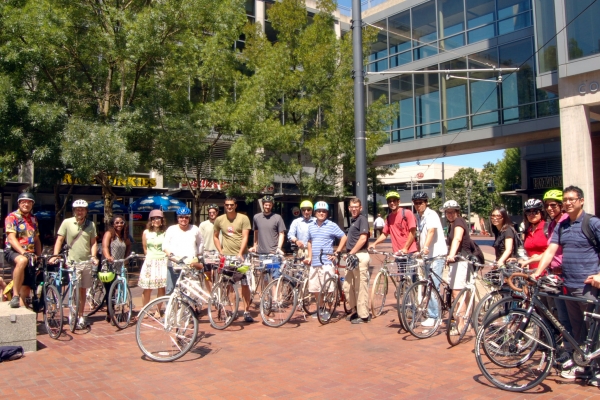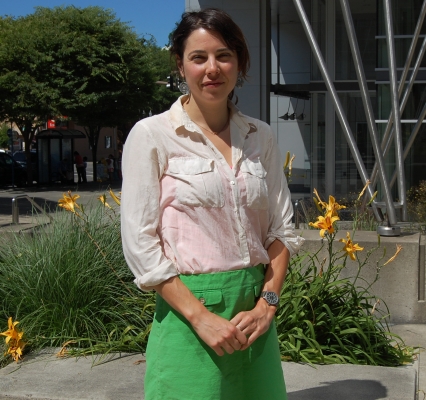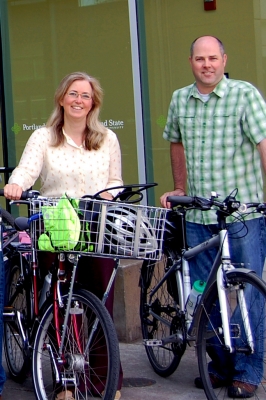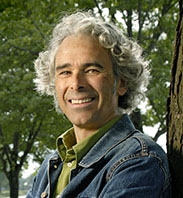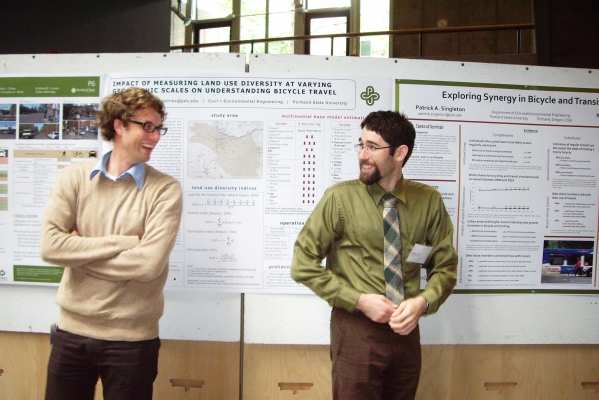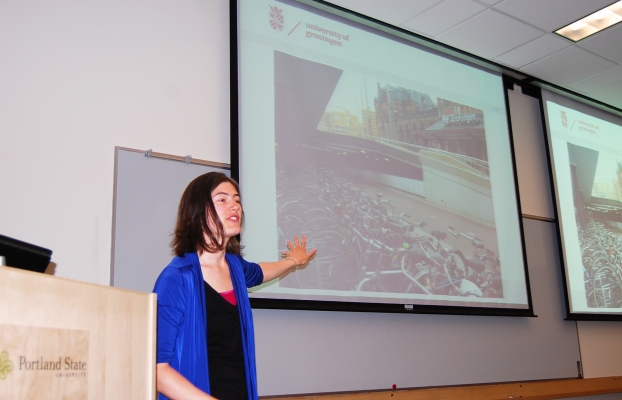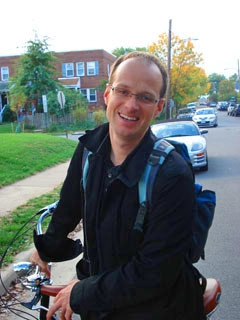(First published by BikePortland.org)
Portland has a network of neighborhood greenways, and they're great. But Jean-Francois Pronovost's is 3,100 miles long. That's approximately the distance from Portland to Nicaragua.
The Greenway (Route Verte in Pronovost's native French) is a bike route network running all over the Canadian province of Quebec. On Monday, the vice president for development and public affairs at advocacy group Vélo Québec visits Portland to share lessons from this project and others in the first annual Ann Niles Transportation Lecture, a major new series produced by Portland State University's Institute for Bicycle and Pedestrian Innovation.
The event is free, though space is limited to 240. On Thursday, BikePortland spoke with Pronovost to learn more about his life's work, the best parts of Quebec bike touring and how his hometown of Montreal managed to replace 320 auto parking spaces with a downtown protected lane that carries 9,000 bikes per day. Questions and answers were edited for space.
Can you describe your most famous achievement, the Route Verte??
The Route Verte [pronounced with hard Ts...
Read moreIBPI, or the Initiative for Bicycle and Pedestrian Innovation, is a center for research and learning that is focused on bicycle and pedestrian travel.
Based at Portland State University, the group's aim is to advance bicycling and walking as integral elements of the transportation system in Oregon’s communities. July 24 -26 IBPI hosted a faculty workshop to help transportation professors integrate bicycle and pedestrian topics into their courses.
Aimed at faculty members teaching transportation courses within an accredited planning or engineering program at the university level, the workshop included curriculum, guidebooks, and field trips to gain first-hand knowledge of bicycle and pedestrian facilities in Portland, Oregon.
It was kept small, to allow for discussion and interaction. The workshop's 15 participants were first given the chance to describe the existing gaps in their courses and what they hoped to gain from the workshop, then guided through a two-day series of activities tailor-made to fit their needs.
Their goals ranged from specific to general, requesting ways to incorporate GIS analysis into bicycle and pedestrian courses, suggestions for how to integrate active travel performance measures with typical vehicular performance measures, and generally a deeper understanding of bicycle research.
Robert Bertini (Portland...
Read moreThe Ann Niles Transportation Lecture series opens Aug. 26 with a lecture from Jean-François Pronovost of Vélo Québec titled "Growing a World-Class Cycling Culture: Lessons from Québec." The series is sponsored by the Ann Niles Transportation Lecture Endowment and serves as a legacy to Ann Niles, an advocate for livable neighborhoods.
Philip Niles created the endowment with a gift to the Initiative for Bicycle and Pedestrian Innovation, or IBPI, in honor of his late wife. Ann Niles was a strong advocate for livable neighborhoods and served on many transportation-related boards and committees in Portland.
The lecture series keeps alive the spirit of Ann Niles' advocacy. Niles pushed for better sidewalks and crosswalks to make Portland a safe and comfortable place to walk, and for bicycle routes and parking to do the same for bicycling.
"This inaugural Ann Niles Transportation Lecture, and all those that follow, help spread Ann's passion for creating livable neighborhoods to students, practitioners and the greater community," said OTREC Director Jennifer Dill.
The series' first speaker, Pronovost, has helped bring active transportation into the lives of people in communities across Québec. As vice president for development and public affairs for Vélo Québec, he helps develop new projects and partnerships.
One of the...
Read morePortland, Oregon is known for being a bike city, even called America's Best Bike City by Bicycling Magazine, so it's no surprise at all that Portland State University is full of bike enthusiasts.
OTREC at Portland State University welcomed Eva Heinen of the University of Groningen, The Netherlands, for a special seminar June 18. Around 40 people attended the presentation, held at the Intelligent Transportation Systems Laboratory and titled “Cycling in the Netherlands and Multi-Modality.”
Eva Heinen is assistant professor of infrastructure planning and mobility at the Department of Spatial Planning and Environment, Faculty of Spatial Sciences, University of Groningen. She earned a Ph.D. from Delft University of Technology in 2011 focusing on bicycle commuting.
Many people in Groningen and The Netherlands as a whole combine transit and bicycling for trips. A typical configuration involves cycling from home to a train station and then renting another bicycle to reach the final destination, Heinen said.
Few people take bicycles on transit, Heinen said, and buses don’t offer bike racks or other accommodations. Folding bikes, whose compact size allows for portability, are one exception, Heinen said. Electric-assist bikes are also popular, particularly with older people.
Heinen has published many papers on cycling in international and national journals and has a large international network in cycling. She spent three months at the University of California in Davis as a visiting scholar. She is a member of the editorial board of Rooilijn, a Dutch journal for science and policy in spatial planning; a member of the Bicycle Committee; co-chair of the...
Read moreWhat makes Americans’ travel behaviors so different from that of their West European counterparts? Longer trip distances? Higher rates of licenses and auto-ownership? A culture and economy that depends on the automobile industry? According to visiting scholar Ralph Buehler, none of these explain the differences in mode splits.
In partnership with Students in Transportation Engineering and Planning (STEP), Portland State University recently hosted visiting scholar Ralph Buehler at the Friday Transportation Seminar series. Dr. Buehler traveled west from Washington, D.C. where he is an Assistant Professor in Urban Affairs and Planning at Virginia Tech’s Metropolitan Institute. Dr. Beuhler’s research and expertise is in multimodal planning and travel behaviors, with a focus on Western Europe and North America.
Click here to view the webcast.
Dr. Buehler’s presentation, titled “Making Urban Transport Sustainable: Comparison of Germany and the US,” poked holes in many of the common theories explaining why Americans are more likely to use their cars for all their travel needs. Instead, he noted that, “transport policies have to explain the difference [in mode shares] over time, including the changes that have happened in Germany and those that have not happened in the US. ” His research has led him to identify four major policy...
Read moreA new transportation class at the University of Oregon, launched in January 2013 and funded by grants from OTREC and NITC, by all accounts had a wonderful first term.
Conceived as part of the curriculum for the Oregon Leadership in Sustainability (OLIS) program at U of O, the course, titled Sustainable Transportation, will be a permanent part of the OLIS class roster and will be open to all graduate students at the university.
The class this winter, led by instructors Ann Scheerer and Larisa Varela, taught applied research in a real-world setting. Students worked on planning projects for the university and for its home community, the City of Eugene, Ore.
On March 20, 2013, U of O's Transportation and Livability Student Group, LiveMove, hosted a public event where students were invited to present their research and interested community members were invited to attend.
The day of the presentations in Eugene was exciting; the “icing on the cake” for Scheerer. Marc Schlossberg, OTREC/NITC executive committee member at U of O and faculty advisor for LiveMove, was there, and so were some professors from the planning department, staff from the sustainability office, and quite a few local transportation advocates.
Scheerer, a...
Read more
